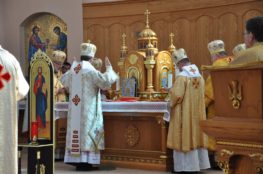I have only just had a chance to peruse the Joint Declaration of Pope Francis and Patriarch Kirill. It is a very surprising document for many reasons which I plan to discuss in due course. For right now I am just going to quote some of the paragraphs that jumped out to me during my initial read.
7. In our determination to undertake all that is necessary to overcome the historical divergences we have inherited, we wish to combine our efforts to give witness to the Gospel of Christ and to the shared heritage of the Church of the first millennium, responding together to the challenges of the contemporary world. Orthodox and Catholics must learn to give unanimously witness in those spheres in which this is possible and necessary. Human civilization has entered into a period of epochal change. Our Christian conscience and our pastoral responsibility compel us not to remain passive in the face of challenges requiring a shared response.
8. Our gaze must firstly turn to those regions of the world where Christians are victims of persecution. In many countries of the Middle East and North Africa whole families, villages and cities of our brothers and sisters in Christ are being completely exterminated. Their churches are being barbarously ravaged and looted, their sacred objects profaned, their monuments destroyed. It is with pain that we call to mind the situation in Syria, Iraq and other countries of the Middle East, and the massive exodus of Christians from the land in which our faith was first disseminated and in which they have lived since the time of the Apostles, together with other religious communities.
9. We call upon the international community to act urgently in order to prevent the further expulsion of Christians from the Middle East. In raising our voice in defence of persecuted Christians, we wish to express our compassion for the suffering experienced by the faithful of other religious traditions who have also become victims of civil war, chaos and terrorist violence.
. . . .
17. Our gaze is also directed to those facing serious difficulties, who live in extreme need and poverty while the material wealth of humanity increases. We cannot remain indifferent to the destinies of millions of migrants and refugees knocking on the doors of wealthy nations. The unrelenting consumerism of some more developed countries is gradually depleting the resources of our planet. The growing inequality in the distribution of material goods increases the feeling of the injustice of the international order that has emerged.
. . . .
19. The family is the natural centre of human life and society. We are concerned about the crisis in the family in many countries. Orthodox and Catholics share the same conception of the family, and are called to witness that it is a path of holiness, testifying to the faithfulness of the spouses in their mutual interaction, to their openness to the procreation and rearing of their children, to solidarity between the generations and to respect for the weakest.
20. The family is based on marriage, an act of freely given and faithful love between a man and a woman. It is love that seals their union and teaches them to accept one another as a gift. Marriage is a school of love and faithfulness. We regret that other forms of cohabitation have been placed on the same level as this union, while the concept, consecrated in the biblical tradition, of paternity and maternity as the distinct vocation of man and woman in marriage is being banished from the public conscience.
21. We call on all to respect the inalienable right to life. Millions are denied the very right to be born into the world. The blood of the unborn cries out to God (cf. Gen 4:10).
. . . .
24. Orthodox and Catholics are united not only by the shared Tradition of the Church of the first millennium, but also by the mission to preach the Gospel of Christ in the world today. This mission entails mutual respect for members of the Christian communities and excludes any form of proselytism.
We are not competitors but brothers, and this concept must guide all our mutual actions as well as those directed to the outside world. We urge Catholics and Orthodox in all countries to learn to live together in peace and love, and to be “in harmony with one another” (Rm 15:5). Consequently, it cannot be accepted that disloyal means be used to incite believers to pass from one Church to another, denying them their religious freedom and their traditions. We are called upon to put into practice the precept of the apostle Paul: “Thus I aspire to proclaim the gospel not where Christ has already been named, so that I do not build on another’s foundation” (Rm 15:20).
25. It is our hope that our meeting may also contribute to reconciliation wherever tensions exist between Greek Catholics and Orthodox. It is today clear that the past method of “uniatism”, understood as the union of one community to the other, separating it from its Church, is not the way to re–establish unity. Nonetheless, the ecclesial communities which emerged in these historical circumstances have the right to exist and to undertake all that is necessary to meet the spiritual needs of their faithful, while seeking to live in peace with their neighbours. Orthodox and Greek Catholics are in need of reconciliation and of mutually acceptable forms of co–existence.
. . . .
30. With grace–filled gratitude for the gift of mutual understanding manifested during our meeting, let us with hope turn to the Most Holy Mother of God, invoking her with the words of this ancient prayer: “We seek refuge under the protection of your mercy, Holy Mother of God”. May the Blessed Virgin Mary, through her intercession, inspire fraternity in all those who venerate her, so that they may be reunited, in God’s own time, in the peace and harmony of the one people of God, for the glory of the Most Holy and indivisible Trinity!




February 12, 2016
That’s quite a bit stronger than anything I was expecting.
February 13, 2016
How is some form of Uniatism not a way forward? I guess I’ve never understood that aspect of the whole
East/West divide. It seems like Uniatism in the sense Catholics being fully Eastern but in Communion with Rome, or Western Rite Orthodox being fully Western but in communion with, say, Moscow, makes perfect sense. What other possible way forward is there?
Granted I understand that Uniatism has a lot of political bad blood, but aside from that it seems like it’s not a bad idea. We cannot just sit and pretend that we are all already in some state of full communion. This would be a betrayal of Orthodoxy and Catholicism as it’s been understood for a very long time.
Are we now seeing Moscow and Rome both drop their respective ” One True Church” rhetoric?
Just so you understand, I’m actually a fully Eastern guy who happens to be Catholic, and who has always been sympathetic to Orthodoxy. I’m just trying to understand this whole situation.
February 13, 2016
I think the issue here is “Uniatism” in a political sense, where whoever happens to be prince/king/tsar/whatever effectively controls what religion his subjects are going to profess. This kind of back and forth, with invasions and incursions, was a hallmark of “Uniatism,” at least until the 20th Century. I say this not to lay blame on the Greek Catholic churches; the Orthodox don’t have clean hands either. But it’s those types of shenanigans that Rome, prudently, wants to avoid at this stage in the game.